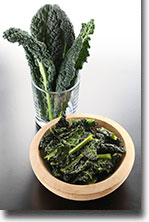 If you have not tried kale yet, now may be the time. Packed with nutrients, it is one of the world’s healthiest foods. The nutrients it contains support healthy skin, hair, and bones. The fiber content enhances digestion and contributes to cardiovascular health.
If you have not tried kale yet, now may be the time. Packed with nutrients, it is one of the world’s healthiest foods. The nutrients it contains support healthy skin, hair, and bones. The fiber content enhances digestion and contributes to cardiovascular health.
With more nutritional value than spinach, it may help improve blood glucose control in diabetes, lower the risk of cancer, reduce blood pressure, and help prevent the development of asthma.
Kale is a green, leafy, winter vegetable that is high in fiber. The potassium content of kale may help reduce the risk of heart disease. It can be a tasty and nutritious side dish or an addition to smoothies and salads. Anyone who is taking blood thinning medication or who has a kidney problem should check with a doctor before adding more kale to the diet.
The nutrients in kale can help boost wellbeing and prevent a range of health problems. It contains fiber, antioxidants, calcium, and vitamin K, among others. Even the chlorophyll in kale may have health benefits. It is also a good source of vitamin C and iron.
The fiber and antioxidants in kale may offer protection against diabetes. Studies have shown that a high intake of fiber may lower blood glucose levels in people with type-1 diabetes. Those with type-2 diabetes may see improved blood sugar, lipids, and insulin levels.
One cup of chopped fresh kale, weighing about 16 grams (g), provides 0.6 g of fiber. A cup of cooked kale (about 130 g) provides 2.6 g of fiber. The Dietary Guidelines for Americans 2015-2020 recommend a fiber intake of between 25 g and 33.6 g for adults aged over 18 years.
Kale contains an antioxidant known as alpha-lipoic acid. Studies suggest that this can help lower glucose levels, increase insulin sensitivity, and prevent oxidative stress-induced changes in patients with diabetes. It may also decrease peripheral neuropathy and autonomic neuropathy in these patients.
Most studies have used high doses of alpha-lipoic acid administered intravenously, rather than dietary sources. Nevertheless, kale can contribute to a healthy daily intake of this nutrient, which is also produced in our bodies naturally.
The fiber, potassium, vitamin C, and vitamin B6 found in kale all support heart health. Increasing potassium intake while decreasing sodium intake is recommended to reduce the risk of cardiovascular disease (CVD).
In one study, participants who consumed 4,069 milligrams (mg) of potassium each day had a 49 percent lower risk of death from ischemic heart disease compared with those who consumed around 1,793 mg per day.
A high potassium intake is also associated with a reduced risk of stroke, protection against loss of muscle mass, preservation of bone mineral density, and reduction in the formation of kidney stones. For lowering blood pressure, consuming more potassium may be as important as decreasing sodium intake, because potassium dilates the blood vessels.
The recommended intake of potassium is 4,700 mg a day. According to the National Health and Nutrition Examination Survey (NHANES), fewer than 2 percent of adults in the United States (U.S.) meet this recommendation. Kale can help boost this intake.
- One cup of chopped fresh kale provides 79 mg of potassium
- One cup of cooked kale provides 296 mg of potassium
- A high potassium intake is associated with a 20 percent lower risk of dying from all causes.
Kale and other green vegetables that contain chlorophyll can help prevent the body from absorbing heterocyclic amines. These chemicals are produced when grilling animal-derived foods at a high temperature, and they are associated with cancer. Although the human body cannot absorb much chlorophyll, the chlorophyll in kale binds to these carcinogens and prevents the body from absorbing them. In this way, it may help limit the risk of cancer.
Some research has suggested that a low intake of vitamin K is associated with a higher risk of bone fracture. While the human body creates most of the vitamin K it needs, adequate vitamin K consumption is important for good health. It helps modify bone matrix proteins, improves calcium absorption, and may reduce the amount of calcium excreted in urine. Kale is a good source of vitamin K.
Kale is high in fiber and water. Both of these help prevent constipation and promote regularity and a healthy digestive tract. It also contains B vitamins, and vitamin C, which promotes iron absorption. These are essential for the release of energy from food.